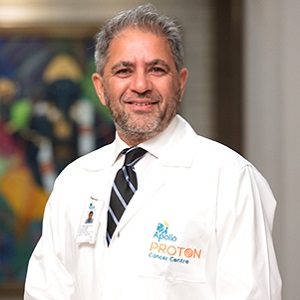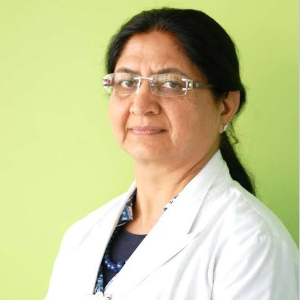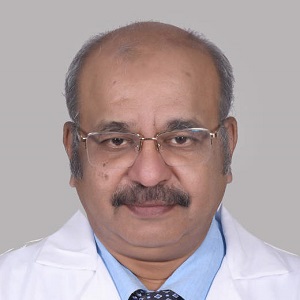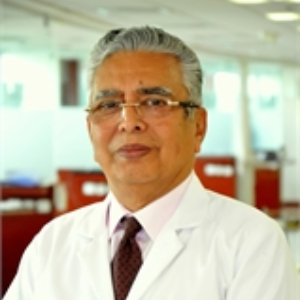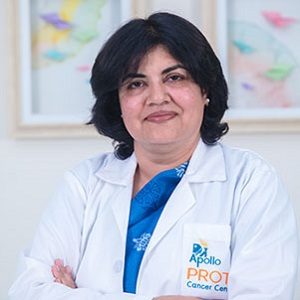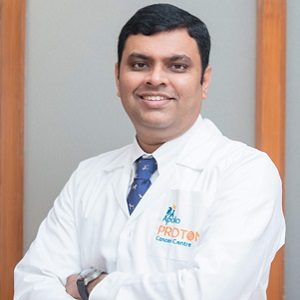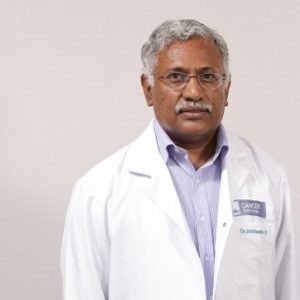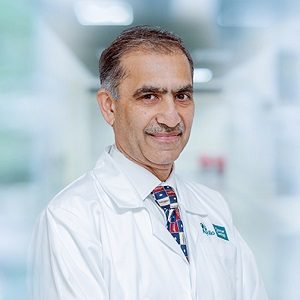Best Radiation Therapists in India
- Neuro Oncologist, Chennai, India
- Over 28 years’ experience
- Apollo Proton Cancer Centre
Profile Highlights:
- Dr. Rakesh Jalali is undoubtedly one of the top Radiation Oncologists in the country who is renowned for his high-precision radiation techniques.
- He provides a wide range of radiation treatments customized to treat different kinds of cancers.
- Dr. Jalali, who has a remarkable 28-year of experience in the field of Neuro-Oncology, is highly proficient in employing sophisticated radiation treatment procedures, such as Electron Beam Radiation treatment (3DCRT), IMRT, IGRT, VMAT, BRT, SABR, DIBH, Brachy Treatment, TBI, and TSET, as well as 4D Gated Radio Treatment. These treatments are carefully employed to treat various kinds of cancers such as brain tumors, breast cancer, lung cancer, prostate cancers, and many more.
- Radiation Oncologist, Gurugram, India
- Over 32 years’ experience
- Medanta-The Medicity, Gurgaon
Profile Highlights:
- Dr. Tejinder Kataria is a globally renowned Radiation Oncologist whose pioneering contributions have significantly advanced cancer treatment in India.
- With over 35 years of experience, she has been instrumental in introducing cutting-edge technologies and establishing prominent oncology departments across prestigious institutions. She is currently the Chairperson of Radiation Oncology at Medanta – The Medicity in Gurugram, New Delhi.
- Dr. Kataria played a pivotal role in founding the Department of Radiation Oncology at Rajiv Gandhi Cancer Institute, New Delhi, and Artemis Health Institute, Gurugram. She also established the Division of Radiation Oncology at Medanta, Gurugram, where she continues to innovate and lead.
- Her interests lie in Stereotactic Radio Treatment (SBRT), Image-Guided Radio Treatment (IGRT), Intensity Modulated Radio Treatment (IMRT), 3-D Conformal Radiation (3D CRT), PET-CT, MRI, SPECT, DSA and CT-Simulator fusion for treatment planning.
- Top Radiation Oncologist | Apollo Hospital, New Delhi, India
- 20+ Years Experience
- Indraprastha Apollo Hospital, New Delhi
Profile Highlights:
- Dr. G K Jadhav is one of the leading radiation oncologists in India.
- He has a complex understanding of cancer biology, clinical care, and radiation physics.
- Dr. Jadhav has an experience of more than 20 years in the field of radiation oncology.
- Radiation Oncologist, Gurugram, India
- Over 40 years’ experience
- Artemis Hospital, Gurgaon
Profile Highlights:
- Dr. Subodh Chandra Pande is a well-known radiation oncologist in India. He has a long and rich clinical and teaching experience in the specialty of radiation oncology.
- He included a Dual Energy Linear Accelerator with Multi-Leaf Collimator at Bhagwan Mahaveer Cancer Hospital and Research Centre (BMCHRC), Jaipur & which was a first for the State of Rajasthan.
- Radiation Oncologist, Chennai, India
- Over 33 years’ experience
- Apollo Proton Cancer Centre
Profile Highlights:
- Dr. Sapna Nangia is a highly proficient clinical and radiation oncologist with versatile experience in cancer management.
- She has an experience of more than 33 years as a doctor across various eminent institutions in the country.
- Radiation Oncologist, Chennai, India
- Over 15 years’ experience
- Apollo Proton Cancer Centre
Profile Highlights:
- Dr. Srinivas Chilukuri has been in one of the top layers of Oncologists in India. He is a renowned Radiation Oncologist with extensive experience. He is also a major thought leader in the field, particularly with regard to high precision radiation treatment, which includes Particle Beam Radiation.
- Radiation Oncologist, Chennai, India
- Over 25 years’ experience
- Apollo Cancer Centre
Profile Highlights:
- Dr. Mahadev P is a radiation oncologist with 25+ years of experience and has played a major role in starting the Diplomate of National Board course in Radio Treatment in 2005.
- After getting trained in Australia, Dr. Mahadev P started Prostate Brachy Treatment at Apollo Specialty Cancer Hospital.
- Dr. Mahadev is also trained in Cyberknife radiosurgery – the only system in the world to treat tumors in the body with sub-millimeter accuracy.
- Radiation Oncologist, Chennai, India
- Over 24 years’ experience
- Apollo Cancer Centre
Profile Highlights:
- Dr. Rathna Devi is a senior Radiation Oncologist who has an experience of 24 years in the field.
- She completed MBBS from M.S. Ramaiah Medical College, Bangalore University, and a Diploma in Radio Treatment from Madras Medical College, Dr. MGR Medical University.
- Dr. Rathna Devi’s areas of expertise include Cranial Cyberknife Radiosurgery, Intensity Modulated Radio Treatment (IMRT), and Stereotactic Body Radio Treatment (SBRT).
- Radiation Oncologist, Chennai, India
- Over 10 years’ experience
- Apollo Proton Cancer Centre
Profile Highlights:
- Dr. Ashwathy Susan Mathew has been an eminent doctor hailing from the Department of Radiation Oncology Apollo Proton Cancer Centre, Chennai.
- She has performed extensive research in the diagnosis and treatment of Gastro-Intestinal Cancers and related metastasis.
- She has been awarded the Parvati Devi Gold Medal for Best Paper at the 34th Annual Conference of the Association of Radiation Oncologists of India.
- Radiation Oncologist, Chennai, India
- Over 30 years’ experience
- Apollo Cancer Centre Chennai
Profile Highlights:
- Dr. Sanjay Chandrasekar is one of the top Radiation Oncologists in Chennai who has an extensive experience of more than 30 years in the field.
- He is currently serving as a Senior Consultant of Radiation Oncology at Apollo Cancer Centre in Chennai.
- His 30+ years-long journey in the field of oncology has brought him a lot of appreciation and recognition in his medical career.
- He has a great deal of expertise treating a range of cancer ailments such as brain tumors—both benign and malignant, head and neck cancers, lung cancer, and uro-gynecological cancers.
- Over the years he has also published numerous papers in peer-reviewed journals on both national and international level. In addition, he has received several honors and commendations for his efforts.
Best Radiation Oncology Hospitals in India
- City: Gurugram, India
Hospital Highlights:
- One of India’s best and largest multi-specialty hospitals, Medanta was built with the aim to bring India to the highest standards of medical care. The hospital has been providing the best medical services to its patients, since its inception, with care, commitment, and compassion.
- Equipped with 1250 beds, the hospital was founded by Dr. Naresh Trehan in the year 2009 with an aim to provide the best medical care at affordable costs. The hospital is spread across 43 acres and includes 45 operation theatres and 350 beds dedicated solely to ICU. The hospital includes over 800 doctors, and more than 22 specialty departments and has a dedicated floor for individual specialty in order to offer the best services under one roof.
- The hospital is considered one of the premier institutes in India for Cardiac Care and includes staffs and members of high caliber. The hospital has 6 distinct centers of excellence.
- City: Gurugram, India
Hospital Highlights:
- Artemis Hospital, established in 2007 in Gurugram, India, is a leading multi-specialty institution known for its excellence in patient care and advanced medical technology, offering comprehensive services across specialties like Cardiology, Oncology, Neurology, Orthopedics etc.
- Renowned for its patient-focused care, Artemis Hospital combines state-of-the-art infrastructure with a team of internationally trained doctors and surgeons, ensuring the highest standards of medical treatment.
- Accredited by JCI and NABH, Artemis Hospital meets global healthcare quality and safety standards, reflecting its commitment to providing compassionate, personalized care.
- The hospital is recognized for utilizing cutting-edge diagnostic and ther*peutic techniques, ensuring patients receive accurate diagnoses and effective treatments tailored to their needs.
- City: Chennai, India
Hospital Highlights:
- The Apollo Proton Cancer Centre in Chennai is the most sought-after private cancer hospital in India. It is an integrated facility that provides cutting-edge, all inclusive cancer treatment to patients all over the globe.
- The hospital is a part of the renowned Apollo Group which has a large network of over 74 hospitals in India and across the globe. Out of the 74 hospitals, 21 of them are cancer centres. However, Apollo Proton Cancer Centre is the only cancer hospital to have JCI accreditation.
- The Centre, which was established on the principles of excellence and expertise, unites a formidable medical staff led by some of the most illustrious figures in cancer treatment.
- The hospital follows the global ASTRO Model Policy. It is the same global policy which is followed by countries like USA, UK, and Europe.
- Apollo Proton Cancer Centre is among the very few hospitals in India to receive patients from First World countries such as USA, Canada, New Zealand, Australia, Singapore, Thailand, etc.
- Apart from that, it is also the first hospital in Chennai to receive patients from several countries like Uzbekistan, Kazakhstan, Turkmenistan, Georgia, Armenia, Azerbaijan, SAARC countries (Bangladesh, Nepal, Sri Lanka, Maldives, Bhutan, Afghanistan, and Pakistan), South Africa, Turkey, Egypt, etc.
- In fact, there is a dedicated team at the Apollo Proton Cancer Centre that serves only international patients. Thus, on a monthly basis, the Centre receives patients from across 32 countries.
- Moreover, there are certain treatments in Apollo Proton Cancer Centre that are not available in any other centre. APCC addresses all types of possible cancers that are usually not covered by any other centre.
- City: New Delhi, India
Hospital Highlights:
- Over the last 33 years, the Fortis Escorts Heart Institute has set new standards in cardiac treatment with groundbreaking research. It is now known around the world as a centre of expertise for Cardiac Bypass Surgery, Interventional Cardiology, Non-invasive Cardiology, Paediatric Cardiology, and Paediatric Cardiac Surgery.
- The hospital has cutting-edge laboratories that perform a wide range of diagnostic tests in Nuclear Medicine, Radiology, Biochemistry, Haematology, Transfusion Medicine, and Microbiology.
- Fortis Escorts Heart Institute boasts a diverse group of bright and experienced doctors who are backed up by a team of highly qualified, experienced, and devoted support professionals as well as cutting-edge equipment such as the recently installed Dual CT Scan.
- Approximately 200 cardiac doctors and 1600 personnel currently collaborate to manage over 14,500 admissions and 7,200 emergency situations each year. The hospital now has a 310-bed infrastructure, as well as five cath labs and a slew of other world-class amenities.
- City: Gurugram, India
Hospital Highlights:
- Fortis Memorial Research Institute (FMRI) is a premier multi-super-specialty, quaternary care hospital, known for its exceptional international faculty, top-tier clinicians, super-sub-specialists, and specialized nurses, all supported by cutting-edge technology.
- It is the flaship hospital of Fortis Healthcare Limited, part of IHH Healthcare Berhad, a leading integrated healthcare services provider in India. As one of the country’s largest healthcare organizations, Fortis operates 28 healthcare facilities with over 4,500 operational beds (including O&M facilities) and more than 400 diagnostic centers (including joint ventures).
- Recognized as one of the top hospitals in India, FMRI serves as a leading referral center and aspires to be the ‘Mecca of Healthcare’ for India and beyond. Its 11-acre campus is a testament to its commitment to providing world-class healthcare.
- Accredited by JCI and NABH, FMRI is dedicated to maintaining the highest standards of healthcare quality and safety, ensuring that every patient receives the best possible care. The hospital’s reputation is further enhanced by its state-of-the-art facilities and innovative medical practices.
- City: New Delhi, India
Hospital Highlights:
- The Indian Spinal Injuries Center (ISIC), provides state-of-the-art facilities for the management of all types of spinal ailments.
- Staffed with internationally trained, acclaimed, and dedicated spine surgeons, the hospital provides cutting-edge medical & surgical technology. The hospital provides comprehensive management of spinal injury, back pain, spinal deformities, tumors, osteoporosis, etc.
- The hospital performs motion-preserving spine surgeries including disc replacement and dynamic fixation, and minimally invasive spine surgeries such as endoscopic disc excision.
- The orthopedic service of the hospital covers all orthopedic ailments including trauma, joint diseases & replacements, oncology, pediatric orthopedics & upper limb ailment.
- City: Faridabad
Hospital Highlights:
In the sprawling city of Faridabad, where healthcare needs are diverse and ever-evolving, one institution has consistently stood out as a beacon of excellence in the field of medicine—Marengo Asia Hospital. Established with a vision to provide world-class healthcare services to the community it serves, Marengo Asia Hospital has emerged as a trusted name synonymous with quality, compassion, and innovation in healthcare.
- City: New Delhi, India
Hospital Highlights:
- Indraprastha Apollo Hospital is a 700-bedded multispecialty hospital in the heart of the capital of India. It is a part of Apollo Hospital group, one of India’s most reputed healthcare chains. Indraprastha Apollo Hospital has been accredited by Joint Commission International, making it the first internationally accredited hospital in the country in 2005.
- There are 52 specialties in the hospital with one of the best cardiology centers in the country. The hospital is also equipped with State of the art infrastructure facilities with the largest Sleep Lab in Asia and the largest number of ICU bed facilities in India.
- The latest and highly advanced technologies that are installed in the hospital include Da Vinci Robotic Surgery System, PET-MR, PET-CT, Cobalt-based HDR, Brain Lab Navigation System, Tilting MRI, Portable CT scanner, 3 Tesla MRI, 128 Slice CT scanner, DSA Lab, Endosonography, Hyperbaric Chamber and Fibro scan.
- City: New Delhi, India
Hospital Highlights:
- One of the well-regarded providers in India committed to the highest standards of clinical excellence and patient care, Max Super Specialty Hospital is a part of Max Healthcare, which is the second-largest healthcare chain in India. Regarded as one of the most well-regarded healthcare providers in the country, Max Super Specialty Hospital is committed to the highest standards of clinical excellence as well as patient care. The hospital is also equipped with the latest technology as well as cutting-edge research. The hospital is known to deliver and ensure the highest level of patient care.
- The hospital has more than 500 beds and offers treatment for over 35 specialties. The hospital also holds the credit of having installed the first Brain Suite in Asia. This is a highly advanced Neurosurgical machine that allows MRI to be taken while surgery is ongoing.
- Other advanced and latest technologies are also installed in the hospital such as the 1.5 Tesla MRI machine, 64 Slice CT Angiography, 4D ECHO, LINAC, and 3.5T MRI machine.
- City: Kolkata, India
Hospital Highlights:
- Founded in 2017, the HCG EKO Cancer Centre is a committed, all-inclusive cancer care facility in Kolkata.
- The hospital was collaboratively established by India’s leading cancer care provider HCG (HealthCare Global Enterprises Ltd.), and EKO Diagnostic Pvt. Ltd., a top diagnostic and imaging chain in Eastern India.
- With 88 beds, the hospital provides a full spectrum of services including diagnosis, prevention, screening, second opinions, treatment, rehabilitation, follow-up, and palliative care.
- Additionally, the hospital contains a day-care chemotherapy ward, Neutropenic ward, medical ICU, pharmacy, blood bank, and an IPD wing.
- At HCG EKO Cancer Centre Kolkata, a large team of cancer experts with experience in medical oncology, surgical oncology, radiation oncology, hemato oncology, BMT, and nuclear medicine collaborate to offer a variety of treatment options under one roof.
- Furthermore, the hospital is also known for employing the most advanced radiation technology such as, the Radixact, a next-generation TomoTherapy equipment that provides greater radiation delivery precision.
What is Radiation Therapy?
Radiation therapy is a type of cancer treatment that uses high level radiation doses to either kill and eliminate the cancer cells or to shrink the malignant (cancerous) tumors in the body. In fact, every time you use an X-Ray to peep inside your body for a broken bone, you are using an ultra low-dose radiation therapy to obtain the images.
The primary goal of radiation therapy is to focus on the abnormal cell multiplication (in case of cancer) and destroy the growing cells without causing damage to the healthy cells around it. This is probably why radiation therapy is based on precision and expertise and is handled by professional Radiation oncologists only.
Quick Fact:
Radiation therapy is quite popular for cancer treatments, but did you know this form of treatment can also be used for thyroid disorders and certain blood-related diseases too?
How does Radiation Therapy work?
The whole point of radiation therapy is to prevent the growth of abnormal cells which are primarily responsible for cancer. Now, this is done using high, focused light or heat waves which according to science, breaks down the DNA of the cancer cells in such a way that repair or growth becomes impossible for them.
However, do note, radiation therapy does not affect the cancerous cells right away. It may take weeks for the effect to start and the radiation left in the body from the treatment can continue to kill cancerous cells for weeks to come. Often, multiple radiation therapy settings are recommended to impact the cancerous cells.
Radiation Therapy Types: External Beam Vs Internal Radiation
The type of radiation therapy depend on a lot of variables, which include-
- The type of cancer or the part of the body affected
- The growth rate or size of the tumor
- Previous medical history / current medical conditions
- Whether alternative treatment methods will be better or not
- Age, severity of the tumor, patient’s immunity etc.
External Beam Radiation
External Beam Radiation uses a machine to aim the radiation waves at the cancer cells/ tumor. This is a beam-centric, local treatment method where the machine will not touch you, but it will move around the part of the body with the cancer cells.
Internal Radiation
Internal Radiation uses an invasive form of treatment method where the radiation is induced in your body in a solid/ liquid form.
- Brachytherapy is a form of internal radiation therapy that uses a radioactive implant in the form of capsules or seeds (solid) to target the cancer cells.
- Systemic radiation therapy is another form of internal radiation which uses swallowing, IV or injection (liquid) to target the cancer cells.
Are there any side effects to Radiation Therapy?
Radiation therapy is notoriously known for its side-effects which may vary from person to person. This depends on the amount of radiation exposure, the body part that has been exposed to radiation, the overall health and immunity/ core strength of the patient, etc.
Radiation therapy side effects can be divided into two parts, more precisely:
Short term side-effects
These show up during or immediately after the procedure and may stick around for a few days or weeks after that. These side effects include:
- Extreme fatigue
- Constant feeling of nausea (may be accompanied by vomiting )
- Diarrhea
- Hair loss
- Change in skin color/texture
These side-effects are often harmless (if experienced in moderation) and are most likely to go away on their own.
Long term Side-effects
These side-effects are a tough nut to crack and may often leave long, if not permanent damage. These include-
- Lymphedema- a condition where lymph fluid build-up may cause extreme pain and discomfort in patients
- Heart or lung damage (if the radiation therapy is directed to/ or nearby to the chest region)
- Increased thyroid problems
- Hormonal changes in women which may lead to menstrual irregularity or menopause.
The good news is, not everyone who undergoes radiation therapy experiences long-term side effects from this condition. However, radiation exposure to certain body parts can increase the risk of long-term effects.
What type of cancers can be treated using Radiation Therapy?
The radiation therapy is often determined by the position of the cancer. For example, Brachytherapy is often recommended for cancer in the eye, neck, breast, cervix or prostate whereas systemic radiation can be used for thyroid gland and hormone related cancers. Based on your diagnosis, your healthcare professional will be the best judge of which radiation therapy to use and for which part.
The Radiation Therapy Dream Team
Here’s a run down of the main team of healthcare professionals who will be appointed to treat you-
- Radio Oncologist & respective nurse
- Radiation therapist
- Radiation physicist
- Dosimetrist (to determine the accurate dosage required)
- nutritionists/ additional help / physical therapists (will be appointed post-therapy as additional help)
What are the other treatments that are used along with Radiation Therapy?
Radiation therapy is not a stand-alone treatment. Often cancer treatments include a medley of procedures, amongst which radiation therapy is one of the crucial ones. However, procedures like chemo, targeted therapy or surgery still are the front-runners to cancer treatment. Radiation therapy is often combined with these or either one of these procedures for maximum effect, pain relief and steady cancer cure.
Radiation Therapy- pre-treatment preparation
Here’s a quick rundown of everything you should cover before your radiation therapy takes place. This includes-
- Helping your medical professionals with a full-suite medical history, including your past or current medication prescription
- Your doctor will prescribe some physical exams which has to be completed and submitted to your doctor on-time.
- Ask your doctor for dietary requirements for 24 hrs leading up to the procedure
What to expect from/ during Radiation Therapy?
We know it must be nerve-wrecking heading for radiation therapy which is why we have listed down everything you should expect during the procedure.
- Before starting the procedure, your radiation oncologist will determine the type of therapy and the required dosage for the procedure.
- Initially an image-testing will be prescribed to locate the exact point where the radiation should be focused at.
- You may be asked to wear a plaster cast to ensure the focus point remains steady and still throughout the radiation process. Don’t worry, this is temporary.
- Often patients undergoing internal radiation are subjected to anesthesia to reduce pain and discomfort.
- The external radiation therapy is painless and you will not feel any discomfort during the procedure. However, surrounding healthy tissues and cells, often exposed to radiation, may show signs of distress.
- Radiation therapy usually continues for weeks- often on a consecutive 5-day stretch with a 2-day break to help the surrounding affected tissues heal themselves.
What will your post-Radiation Therapy care be like?
Radiation therapy may leave some short and long term side effects, most of which will affect your diet. We have summarized your diet requirements below, but it’s best if you can ask your appointed nutrition for details since dietary regulations vary from person to person.
Diet Check: Since nausea (and maybe vomiting) will be persistent during this time, your body may develop some mouth sores or throat problems along with it. However, a recovering body would need a lot of energy which is why high calorie and protein intake should be added to your everyday diet.
Lifestyle Check: While some patients are strong enough to continue everyday chores and work during radiation, some might need a little more time to get back to their usual life. Since fatigue will be a common side effect around this time, we encourage patients to mostly work from home or from a comfortable setting where they can get their rest as and when needed.
FAQs
Is Radiation therapy only used to kill the cancer?
In the initial stages, yes, radiation therapy solely focuses on killing the cancer cells, but later in the recovery period, radiation can be used to treat pain and discomfort in patients too.
How long will the side-effects last?
Depending on a lot of factors, your radiation therapy side-effects can be in the form of nausea or extreme tiredness which are depicted as EARLY side effects. These last for a few weeks after the procedure. LATE side effects such as heart or lung problems will probably take years to recover.
Is medical leave necessary for radiation therapy?
This heavily depends on your body’s ability to heal and your level of fatigue. Since side effects like extreme tiredness and nausea may accompany you for a few days- it’s necessary to first access your situation before committing yourself to work.
My side effects are increasing- what should I do?
Notify your doctor immediately.
How should I take care of the radiation exposed area?
Your healthcare professional will help you out with the care guidelines. In most cases, the skin around the exposure area will be sensitive and should not be exposed to harsh chemicals (cosmetics) or direct sunlight.

